
Guests
- Evan Youngthe 2015 valedictorian of Twin Peaks Charter Academy High School in Longmont, Colorado. His principal, BJ Buchmann, prevented him from delivering his graduation speech in which he planned to out himself as gay.
Part two of our interview with Evan Young, 2015 valedictorian of Twin Peaks Charter Academy High School in Longmont, Colorado. Young’s principal prevented him from delivering his graduation speech in which he planned to out himself as gay. This past weekend, Evan was able to give his speech at an Out Boulder fundraiser in a backyard before an audience of hundreds, a number of them politicians congratulating him for his bravery, including Colorado Congressman Jared Polis. Polis is the first openly gay member of Congress to become a parent.
Transcript
NERMEEN SHAIKH: We return now to the case of Evan Young, the Colorado charter high school valedictorian who was barred from speaking at graduation because he was planning to come out as gay. On May 16th, he was scheduled to deliver the 2015 class valedictorian address at Twin Peaks Charter Academy High School in Longmont, Colorado. But just before the ceremony, his principal prevented him from giving his graduation speech after learning that Evan would be outing himself as gay.
AMY GOODMAN: This past weekend, Evan was able to give his speech at an Out Boulder fundraiser in a backyard before an audience of hundreds.
EVAN YOUNG: Where would we be without the Internet, probably the greatest invention since the wheel? In fact, I dare say the Internet is better than the wheel because as I’m sure you visitors from out of state can testify, wheels are pretty useless unless you have Google Maps to tell you where to go. Whether you’re scrolling through Facebook instead of working, or frantically reading through Sparknotes in the five minutes before English class because you forgot to do the reading last night (come on, you know you’ve all been there), you just can’t thank the Internet enough. I mean, really.
And finally, I’d like to thank the Coca-Cola Company and all its subsidiaries, which have not only stood as unshakable icons of American consumerism, but have also provided mankind with a delicious source of caffeine for so many years. And I’d like to say this speech is sponsored by them, but it’s not. They didn’t give me any money. Unlike Hillary Clinton, I don’t make millions of dollars a year for flapping my lips.
And now we arrive at the heart of the speech, the inspirational and meaningful part. For those of you who have already been sufficiently inspired, or who have already determined the meaning of their existence, feel free to play on your phone. Just remember to laugh every once in a while so I feel like I’m being funny. But for the rest of us, we’re going in. […]
There is something I would like to reveal to you. You may have already suspected this, but I hope this does not change your opinion of me: I am gay. I’ve been attracted to men for as long as I can remember, but I’ve never had a girlfriend because I prefer members of my own sex.
AMY GOODMAN: That’s an excerpt of Evan Young’s speech. We played the full speech on Monday’s show, which you can watch at democracynow.org. But now we turn to part two of our exclusive interview with Evan Young. It begins with Congressmember Jared Polis, who also spoke at the Out Boulder event where Evan finally gave his speech.
REP. JARED POLIS: You know, Evan, I did find your speech a little controversial. As somebody who has labored against soft drinks out of schools, your shameless promotion of Coca-Cola is somewhat controversial.
You know, we like to think—we’re very proud as Boulder County residents. My goodness, we, with Clela Rorex here, had the first same-sex marriages in 1975. We’ve even had people come out in their graduation speeches before here in Boulder County, at Fairview High a couple years ago. But it really is a reality check for many of us to think, in this day and age, here in Boulder County, in a public school, that this kind of discrimination, singling out Evan purely on the basis of his sexual orientation, is able to occur. And I truly hope that the St. Vrain School Board holds Twin Peaks fully accountable, under the charter and under the state law, for these actions.
I have a certificate, as well, which I’d like to read for Evan. It says, “Certificate of Special Congressional Recognition presented to Evan Young in recognition of outstanding and invaluable service to the community,” and truly in elevating this issue and letting all of us, as concerned citizens, know that these issues of discrimination still exist in this day and age, that purely on the basis of sexual orientation, somebody can be denied their academic honors—that in his case he didn’t work too hard to achieve, but nevertheless he earned. And, of course, the speech that he was selected to give shows that Out Boulder, One Colorado, HRC, all of the advocacy groups, locally, at the state level and nationally, need to redouble our efforts. And while Boulder was the first for gay marriage, we also need to redouble our efforts to make sure that we are the last time that somebody like Evan will have to go through what he had to go through and graduated high school.
AMY GOODMAN: That was Jared Polis, who is the openly gay congressmember from the area representing Boulder and Longmont. Evan Young joins us from Denver, Colorado, from the studios of Denver Open Media. Evan, how did it feel to both give your speech and then be given this citation, congressional recognition for what you’ve contributed to the community?
EVAN YOUNG: Yeah, it was crazy. When I was initially denied the right to give my speech, I was a little mad, but I had no idea it would go this far and that I would receive so much support from so many people. It was just awesome.
AMY GOODMAN: Talk about how this took place on May 16th, your preparation for the speech. You actually went to—was your high school graduation at your school?
EVAN YOUNG: Yes, I went to the graduation, yeah.
AMY GOODMAN: And it took place actually at your school? And you were—
EVAN YOUNG: Oh, yeah, it took place at the school.
AMY GOODMAN: And you were actually holding your speech, ready to give it, when the principal came over to you and said you wouldn’t be giving the speech?
EVAN YOUNG: Yes. It was a couple minutes before I was about to go out into the auditorium, and I had my speech in hand. And then he said I couldn’t give it. So I kind of wadded it up in a ball and threw it in my backpack.
AMY GOODMAN: Were the other students surprised?
EVAN YOUNG: Actually, a lot of my friends were really mad that I wasn’t allowed to give the speech, even before they knew the reason why I wasn’t allowed to give it. They had really wanted to hear it, I guess.
AMY GOODMAN: So there was no speech given by a student?
EVAN YOUNG: So there were supposed to be five speeches that night. So, first, it was a guest speaker, who was one of my friends’ dads. Then it was a speech by a teacher. And then it was the third place person, a historian or something. Then, it’s the salutatorian, the second place person, gave a speech. And then, finally, it was supposed to be the valedictorian, which was me, but I wasn’t able to give that. So there were four speeches that night, but there were supposed to be five. And I was the last one, but wasn’t able to give it.
AMY GOODMAN: So, Evan, did they acknowledge you as valedictorian of the class of 2015 at Twin Peaks Charter Academy High School?
EVAN YOUNG: They didn’t, although the board actually gave me a $500 scholarship for academic achievement, which I was very happy about that. But, no, they never mentioned that I was the valedictorian.
AMY GOODMAN: I’m looking at a number of articles that were written about what happened. This statement, attributed to the school attorney, Barry Arrington, said a graduation ceremony is, quote, “a time for family and those closest to the students to celebrate success and express mutual wishes of gratitude and respect. It is not a time for a student to use his commencement speech to push his personal agenda on a captive audience, and school officials are well within their rights to prevent that from happening.” Evan, your response?
EVAN YOUNG: Well, I think they missed the whole point of the speech. I wasn’t trying to get people in the audience to accept gay marriage. I was trying to get them to accept me even though they disagree with me. And that was the whole lesson of my speech: You have to be respectful to people even if you disagree with them. And I thought me discussing being gay would be a very good way to get that message across.
AMY GOODMAN: So, you were actually outing yourself in this graduation speech. You hadn’t told your parents. You hadn’t told the community. I’m looking at another article on the response, and it quotes your dad, Don Young, who was previously on the charter school’s board of directors, saying, referring to the president, who is Mr. Buchmann, “Mr. Buchmann called me and said, ’I’ve got Evan’s speech here. There’s two things in it that I don’t think are appropriate. One was he had mentioned another student’s name. And then there was his coming out that he was gay.” So, that’s the first time your father heard this, correct?
EVAN YOUNG: Yes, that is correct.
AMY GOODMAN: Are you hurt that it came from the school principal?
EVAN YOUNG: If there’s anything that upset me the most about this whole situation, it was probably that. And I guess what it showed is that the principal had very little respect or understanding for someone who is in my position. And as I said before, that sort of upset me the most.
AMY GOODMAN: So, the principal is now trying to say that you simply wouldn’t accept edits. What did he want you to edit out of the speech? There were some edits you accepted?
EVAN YOUNG: Oh, yeah, I actually made all of the edits he asked me to except the one. So he asked me to do various things, like at one point he asked me to remove a student’s name. And in retrospect, that was actually a very good idea. I didn’t want to hurt that student’s reputation or anything, so I’m very glad he pointed that out. And then there was another part where I complained about English class, and he said that might hurt the teacher’s feelings, which he was right. I’m glad he pointed that out. My English teach is actually my favorite—one of my favorite teachers. I just don’t like reading books that much. And so I was really glad that he pointed that out, too. So I changed it to a part where I just complain about homework in general. And there were a few parts where he asked me to tone down some of the jokes, and I was happy to do that. So, for the most part, the edits he asked me to make were very good, and I was happy to make them. It was just the one edit—
AMY GOODMAN: What was the joke he wanted you to edit out?
EVAN YOUNG: There were several of them, actually. I’m trying to think of one off the top of my head. Like, there’s one where—so I tell everyone to, like, hug people that they disagree with at the very end of the speech, and I ask Mel Gibson to hug a Jewish person. And he said I shouldn’t have that in the speech. So I actually removed that part for the speech I was going to give to the school, but then, once it was clear I wasn’t going to give it to the school, I put that joke back in, because it was one of my favorite ones. I thought it was kind of funny.
AMY GOODMAN: What did he say about your coming out in the speech?
EVAN YOUNG: He didn’t seem supportive of me doing something like that at all, like he was pretty condescending, and he was almost sort of rude about it. And I don’t want to sound like I’m whining or anything, but he didn’t—he seemed really disgusted that I would include something like that in my speech.
AMY GOODMAN: Did he tell you to remove it?
EVAN YOUNG: Yes, he did, in pretty explicit terms.
AMY GOODMAN: What do you mean?
EVAN YOUNG: Explicit as in not bad words. I was very like straightforward—
AMY GOODMAN: What did he say to you?
EVAN YOUNG: I was very straightforward about how the part—he didn’t think the part was appropriate and how it had to be removed, and it was offensive to people, to be very blunt.
AMY GOODMAN: Were you sitting with him, or did he call you on the phone?
EVAN YOUNG: I was sitting in his office with him, on the Tuesday before the graduation.
AMY GOODMAN: So, presumably, since he’s reading your speech in advance, you were coming out to him, as well.
EVAN YOUNG: Yeah, I was very nervous to give my speech to him, because I didn’t know how he’d react. And my parents actually got kind of mad at me, because I was being so secretive about my speech. And now they know the reason why, because I didn’t know how people, especially him, would react to such a revelation.
AMY GOODMAN: And so, what—how did you feel when Principal Buchmann told you to take that out of your speech, that it wasn’t appropriate?
EVAN YOUNG: Initially, I kind of actually agreed with him. I’m like, “Yeah, maybe I should remove this. Maybe it isn’t the right time.” But then, over the next few days, I began to realize, “Hey, this could—this is a really powerful part of my speech, and it’s essential to the speech, and I can’t just remove it.” So, it was about—it was the day before the graduation that I wrote him a letter where I said, “I’m not going to remove this part from the speech. Here are the reasons why. If you’d like to discuss it, please email me.” And he didn’t email me in the next day or so, so I assumed he was OK with it. But I guess not.
AMY GOODMAN: So, when you gave this speech at Out Boulder to hundreds of people, including a number of politicians, your parents were there. They also spoke. How did your parents react to your speech? Is that the first time they heard it, last night?
EVAN YOUNG: They had actually read it several times before. And they actually really liked the part—the speech. But as my mom said, she was really glad to have heard me speaking it to a crowd, because they never actually heard me deliver the speech before.
AMY GOODMAN: So you go to a charter school, the Twin Peaks Charter Academy High School in Longmont. One of the articles about what happened pointed out that in the Boulder Valley School District, 2013 Fairview High School graduate—this is a public high school, Fairview High—Fairview High School graduate Ted Chalfen gave a commencement address. He had auditioned for the right to do so, as he was not valedictorian. In your school, the valedictorian gives it, but in his school, in the high school, they vote on the speaker. He talked about his status as a gay student. It was already known by a number of his peers that he was gay. And the Fairview principal, Don Stensrud, supported him as a featured speaker. So he was asked what he thought of what happened to you, Evan, and he said, “As sad as it is, it doesn’t shock me that this happened.” Do you know Ted Chalfen?
EVAN YOUNG: I do not, sadly.
AMY GOODMAN: Did you know that a gay student had given the address last year [sic]?
EVAN YOUNG: I had actually looked it up on the Internet before I gave my speech, and I actually didn’t see that anywhere. Yeah.
AMY GOODMAN: So, what are your plans now, as we wrap up?
EVAN YOUNG: Well, I guess I don’t—I’m not going to take any action against the school. My school is a great school, and I think it’s very unfortunate that many people are judging my school on account of this one incident. I think I’m just going to let my 15 minutes of fame fade, and hopefully my school will take action to prevent something like this from happening again. And that’s the only reason I brought this to the press, because I want to make my school better.
AMY GOODMAN: That’s Twin Peaks Charter Academy High School valedictorian Evan Young speaking to Democracy Now! the day after he gave his valedictory address—not, however, to the audience he planned—his classmates and the families of his classmates at graduation—but two weeks later at an Out Boulder event. In a moment, we’ll go to Washington, D.C., to be joined by Congressmember Jared Polis, who represents the area of Colorado where Evan Young lives. He is calling for an investigation of the school. We’ll be back in a moment.

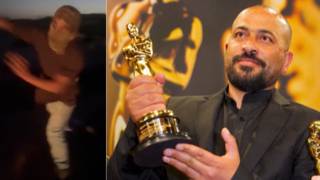
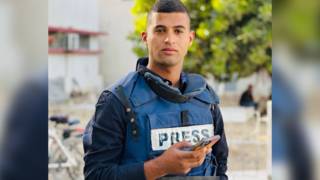
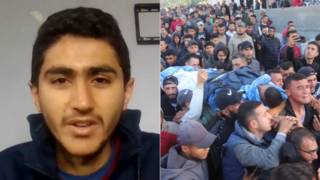
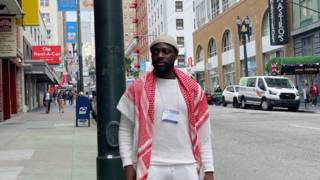






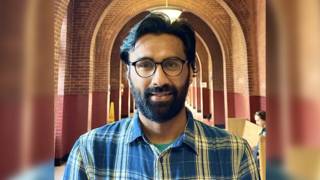
Media Options